
| 
| SPECIAL EDITION - 5G / November 2018 | 
| 
|

| 
|

| 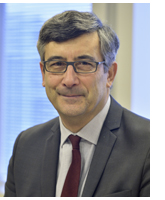 The first mobile phone call was made in 1973, a mere 45 years ago. Several generations of mobile technology have followed since then… and at an increasingly accelerated pace as demand for applications and connectivity has grown. Today, the starting pistol for the global 5G race has already been fired, even though 4G rollouts are not yet complete! The first mobile phone call was made in 1973, a mere 45 years ago. Several generations of mobile technology have followed since then… and at an increasingly accelerated pace as demand for applications and connectivity has grown. Today, the starting pistol for the global 5G race has already been fired, even though 4G rollouts are not yet complete!
5G is as much an evolution as a revolution. Evolution because its first stated uses will focus on increasing the density of 4G networks and completing ultrafast mobile coverage. But 5G’s promised innovations, flexibility and spectacular gains in speed will also make it an industrial revolution: a tremendous enabler of vertical industries’ digitisation, which will be the main 5G market next to consumers. This economic challenge makes its swift deployment a national imperative.
Here, France is still on track. Frequency allocations are well underway: the 700 MHz band has already been allocated, procedures for the C and L and mmWave bands could take place in 2019, and commercial launches in 2020. But frequencies are not the be all and end all. Organising new ecosystems and conducting vital use case trials also require both operators and vertical industry stakeholders to step up: a full commitment from everyone – to test economic use cases as much as technical feasibility – is crucial.
Arcep is well aware that it has a role not merely that of frequency allocator, but also one of facilitator. And it is fully committed to that role, deploying the needed resources and setting a demanding timetable. So the ball is now in economic stakeholders’ court. It is up to them to ensure the successful transition to the industries and services of the future.
Pierre-Jean Benghozi, Arcep Executive Board Member

| 
|

|
Regulation in action
What procedures and conditions for allocating 5G frequencies? Arcep turns to the market for answers
To satisfy newfound requirements and enable innovative uses, 5G needs to employ new frequencies, especially in the high-end bands, to increase mobile networks’ capacity and throughput. Enter the 3.4-3.8 GHz, 26 GHz and 1.4 GHz bands.
Arcep recently launched a public consultation to prepare for these allocations.
The main points on which stakeholders are being asked for feedback include:
- 5G performances and the applications it will enable that are pro-innovation and bolster competitiveness (augmented reality, connected cars, etc.);
- the different players’ (operators, vertical industries, etc.) needs;
- the type and content of future licences, notably the obligations they might carry in terms of coverage or meeting vertical industries’ needs;
- the amount of frequencies available, band by band, and their allocation timetable.
Operators, equipment suppliers, local authorities, industry stakeholders… 5G will only be successful if everyone is on board. Share your requirements and your ideas by responding to this public consultation before 19 December!
The public consultation
Arcep’s 5G battle plan
Arcep details its consultation on new 5G frequency allocations at NextINPact (in French)
5G frequencies: Arcep faced with technical choices, and the possibility of a single player - NextiNPact (in French)
| 
|
| | | | 
| 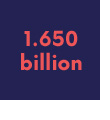
| Tomorrow by the numbers
A 2017 report from China’s Ministry of Industry and Information Technology estimates the country’s combined investments between now and 2025 in 5G at 1,650 billion yuans (over 200 billion euros). | 
|

| On our radar | | François Rancy, Director of ITU’s Radiocommunication Bureau From 2010 to 2018, François Rancy was the Director of the Radiocommunication Bureau for the International Telecommunication Union (ITU), a United Nations institution devoted to telecoms. It plays a pivotal role, ensuring the fair, rational and efficient use of radio spectrum around the world.
Radiocommunication Bureau was an active contributor to the World Radiocommunications Conferences (WRC): every three or four years, more than 180 countries meet to examine or review the Radio Regulations – the international treaty that governs the use of radio frequency spectrum and satellite orbits.
The next WRC, which will be held in late October 2019 in Egypt, will devote itself to identifying the frequency bands (and notably millimetre-wave bands) that can be dedicated to 5G internationally. A highly anticipated event. | 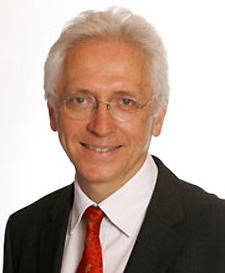
|
|
| | 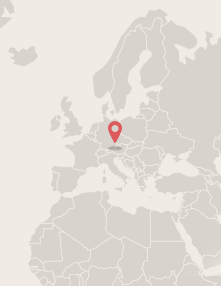
| | News from around the world
At a glance – 5G in Europe, in the United States and in Asia
In Europe
Several countries in Europe have begun allocating a range of frequencies that were identified for 5G rollouts. Italy is currently the only European country to have allocated all of the “pioneer” 5G bands, from low-band frequencies (700 MHz) by way of mid-band spectrum (3.5 GHz) up to millimetre-wave frequencies (26 GHz) that enable the most revolutionary speeds being promised by 5G, albeit with a much more limited range than the frequencies being used by mobile networks today.
Another example: in Germany, 100 MHz in the 3.5 GHz band will be reserved for uses linked to vertical markets and regional players.
What 5G frequencies have been allocated thus far in Europe? Check out the map(in French)!
In the United States
Millimetre-wave frequencies in the 24 GHz and 28 GHz band are being allocated at auction in November. The 600 MHz band is already being allocated to a mobile operator (TMO-US) to deploy 5G in the low-range bands. TMO is cooperating with broadcasters to enable them to release the band as efficiently as possible.
In Asia
South Korea allocated 3.5 GHz and 28 GHz band frequencies to the country’s three mobile operators in June 2018.
In China, the 3.4 – 3.6 GHz and 4.8 – 5.0 GHz, and the 26 GHz and 40 GHz bands are expected to be allocated in the second half of 2019.
Japan has not yet released its timetable for allocations, even though 5G is due to be up and running for the Summer Olympics in Tokyo in 2020.
|
| |

|

L'Arcep likes
5G vs. net neutrality: friends or foes?
Arcep is France’s tireless net neutrality watchdog. For several years now, it has also taken on the role of enabler to prepare for 5G rollouts across the country. Contrary to the assertions of some, Arcep believes that 5G and net neutrality are not incompatible. Innovation can be synonymous with non-discrimination of traffic, provided we ask the right questions: how to deliver different levels of quality of service without discriminating against content? How to let users decide? etc.
To provide a forum for both the yay and the naysayers, Arcep hosted a roundtable on the subject at the Internet Governance Forum on 13 November at Unesco. It also took the opportunity to publish an illustrated snapshot of the issues surrounding this subject.
Find out more: “5G vs. Net neutrality: friends or foes?”
| 
| | | |
|

| Field notes
Arcep to publish a listing of 5G trials in France in the coming days
 Be sure to visit Arcep’s website a few days from now to view the compendium of 5G trials being conducted in France. They will be listed by use case: connected mobility, Internet of Things, Smart City, future manufacturing, virtual reality, telemedicine, UHD video and gaming. The names of the project owners will also be included. Be sure to visit Arcep’s website a few days from now to view the compendium of 5G trials being conducted in France. They will be listed by use case: connected mobility, Internet of Things, Smart City, future manufacturing, virtual reality, telemedicine, UHD video and gaming. The names of the project owners will also be included. | 
|

| Well said | 
|
"There’s a problem with the name 5G. It is not a mere evolution of 4G. 5G is above all the gateway to an industrial revolution.” Thierry Boisnon, DG Nokia France | 
|
|

| Meanwhile in Brussels...
European 5G observatory is up and running!
The European Commission created a quarterly 5G observatory in October, which tracks a range of data such as:
- planned spectrum use in every European country;
- status of 5G trials in Europe;
- national 5G rollout roadmaps;
- and other actions being carried out by industry stakeholders and Member States.
Click here for more information!
 | 
|

| Arcep, telling it like it is
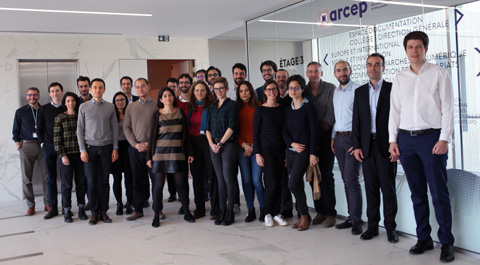 Last month, Arcep updated its 5G battle plan for France. The Authority is engaged in multiple and wide-ranging actions to bring this plan to completion. And virtually every single department is mobilised. Last month, Arcep updated its 5G battle plan for France. The Authority is engaged in multiple and wide-ranging actions to bring this plan to completion. And virtually every single department is mobilised.
Here is a little snapshot of the Arcep teams involved in making 5G a reality, mere months from now:
- the “Mobile and innovation” department. It teams have been enabling and supporting 5G trials nationwide for close to a year. They also prepared the public consultation launched in October on the procedures and conditions for the frequency allocations that will be conducted in 2019;
- the “Fibre, infrastructures and territories” department is also devoted to the issue since fibre will play a key role as the infrastructure undergirding 5G rollouts;
- the “Europe and international” department has an active hand in the work being done by the Body of European Regulators for Electronic Communications (BEREC), which has made 5G one of its priorities for 2019;
- this past summer, Arcep began a new round of investigation to anticipate the networks of the future, and so adapt its job of regulator accordingly. This forward-looking work will map out all of the expected network evolutions and revolutions over the next five to ten years: increasingly agile networks, new spectrum management paradigms… with 5G front and centre. The “Economics, markets and digital” department, and Arcep as a whole, set up a Scientific Committee (Find out more about the scientific committee) to help perform this work. | 
|

|
Mark your calendar
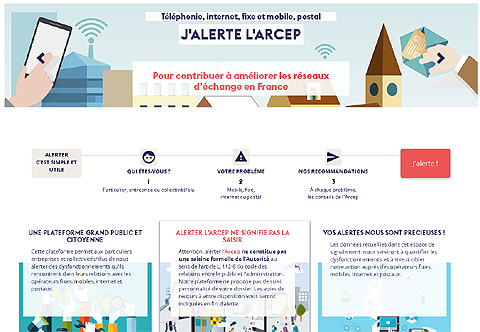
11 December 2018 in Paris | “J’alerte l’Arcep”: the first scorecard!
Arcep will be hosting a press conference to mark the first anniversary of the ”J’alerte l’Arcep” user reporting platform.
How many reports were logged? What are the most common problems reported to Arcep, by both consumers and businesses? What does Arcep do with these complaints? How does Arcep plan on improving this instrument?
Find out on 11 December! | 
|

| 30 November in Paris
AdTech Summit
“Accessing data: are some more equal than others?” is the topic of the keynote that Arcep Chair, Sébastien Soriano, will deliver at the AdTech Summit.
AdTech Summit is the brand new event devoted to the digital advertising ecosystem and technologies, hosted by the IAB France association.
Find out more
3 December in Paris
Presentation of the 2018 Digital Market Barometer
The Digital Market Barometer is THE one-stop publication to find out how French people use digital technology: French people’s device of choice, internet use… Arcep Executive Board member, Martine Lombard, will deliver a presentation and analysis of the findings. This statistical survey has been conducted by CREDOC every year since 2007 on behalf of Arcep, the Economic Council and the French Digital Agency. Eleven years of findings that are available as open data. Our special guest will be Mounir Mahjoubi, France’s Secretary of State for Digital Affairs.
From 3 to 9 December 2018 in Lille
IoT Week by CITC
IoT Week by CITC is a week of events devoted to the innovations and technologies of the future, in the future manufacturing, smart city and society sectors. It is being hosted this year in Lille and the Hauts-de-France region. The programme includes: master classes, conferences, hackathons…
Arcep Executive Board member, Pierre-Jean Benghozi, will be taking part in a day devoted to the “Internet of daily things” – at Euratechnologies on 6 December, in Lille.
Find out more
6 and 7 December in Prague
BEREC plenary meeting
The Body of European Regulators for Electronic Communications (BEREC) will be holding their final plenary meeting of the year in Prague. The agenda will include the adoption of Member States’ common position on mobile coverage, as well as a draft common position on infrastructure sharing.
The BEREC Chair for 2020 will also be elected during the meeting.
Find out more | |

|
![]()
![]()